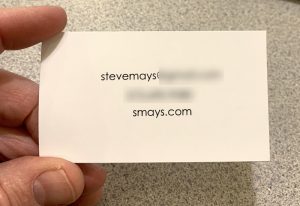 Burger King started serving the Impossible Whopper nationwide yesterday so my friend George and I drove to a nearby town to try one (our Burger King was destroyed by a tornado earlier this year but will re-open next month). I haven’t had a beef hamburger in six years so can’t say I remember what one tastes like but the sandwich BK served up was mighty close. I’ll be eating these a couple of times a week.
Burger King started serving the Impossible Whopper nationwide yesterday so my friend George and I drove to a nearby town to try one (our Burger King was destroyed by a tornado earlier this year but will re-open next month). I haven’t had a beef hamburger in six years so can’t say I remember what one tastes like but the sandwich BK served up was mighty close. I’ll be eating these a couple of times a week.
Category Archives: Business & Marketing
Land Rover Coffee Truck
Calling card
 “A visiting card, also known as a calling card, is a small card used for social purposes. Before the 18th century, visitors making social calls left handwritten notes at the home of friends who were not at home. By the 1760s, the upper classes in France and Italy were leaving printed visiting cards decorated with images on one side and a blank space for hand-writing a note on the other. The style quickly spread across Europe and to the United States. As printing technology improved, elaborate color designs became increasingly popular. However, by the late 1800s, simpler styles became more common.”
“A visiting card, also known as a calling card, is a small card used for social purposes. Before the 18th century, visitors making social calls left handwritten notes at the home of friends who were not at home. By the 1760s, the upper classes in France and Italy were leaving printed visiting cards decorated with images on one side and a blank space for hand-writing a note on the other. The style quickly spread across Europe and to the United States. As printing technology improved, elaborate color designs became increasingly popular. However, by the late 1800s, simpler styles became more common.”
“By the 19th century, men and women needed personalized calling or visiting cards to maintain their social status or to move up in society. These small cards, about the size of a modern-day business card, usually featured the name of the owner, and sometimes an address. Calling cards were left at homes, sent to individuals, or exchanged in person for various social purposes. Knowing and following calling card “rules” signaled ones one’s status and intentions.” (Wikipedia)
Somewhere along the way these evolved into “business cards” and titles and fax numbers and addresses were added. Before contact databases it was common to have huge collections of these little pieces of cardboard.
When I retired I tossed a couple boxes of these (I think I shredded them). And then I realized how handy they can be. Instead of jotting down a phone number or email address on a scrap of paper that will be quickly lost, I keep a few of these in my pocket.
Apple Card
U.S. credit card debt
“Average individual credit card debt (in the U. S.) stands at $5,331 in 2019. Additionally, on a monthly basis, most Americans don’t pay their credit card balance in full every month – 55% don’t regularly pay in full.”
- 83% of U.S. adults own at least one piece of plastic.
- On average, U.S. consumers own three credit cards.
- Total revolving debt stands at $1.04 trillion – that’s up from $857 billion in 2013.
- The average interest Americans pay on their cards stands at 16.46%.
Source: TheStreet.com
More apps caught sending personal info to Facebook
Sam Schechner, reporting for The Wall Street Journal (Subscription required. Here’s John Gruber’s post):
“In the Journal’s testing, Instant Heart Rate: HR Monitor, the most popular heart-rate app on Apple’s iOS, made by California-based Azumio Inc., sent a user’s heart rate to Facebook immediately after it was recorded.
Flo Health Inc.’s Flo Period & Ovulation Tracker, which claims 25 million active users, told Facebook when a user was having her period or informed the app of an intention to get pregnant, the tests showed.
Real-estate app Realtor.com, owned by Move Inc., a subsidiary of Wall Street Journal parent News Corp , sent the social network the location and price of listings that a user viewed, noting which ones were marked as favorites, the tests showed.
None of those apps provided users any apparent way to stop that information from being sent to Facebook.”
So I’m thinking about apps that I use: TextGrabber, Scanner Pro et al. Are they sending my shit to Facebook (even though I don’t have an account?). Apple needs to stop this shit or at the ver least tell us which apps are doing this so we can delete them.
Team Human
 Excerpts from Team Human by Douglas Rushkoff.
Excerpts from Team Human by Douglas Rushkoff.
There’s a reason for our current predicament: an anti-human agenda embedded in our technology, our markets, and our major cultural institutions, from education and religion to civics and media.
Thinking, feeling, connected people undermine the institutions that would control them. […] Our institutions and technologies aren’t designed to extend our human nature, but to mitigate and repress it.
It doesn’t take much to tilt a healthy social landscape toward an individualist or repressive one. A scarcity of resources, a hostile neighboring tribe, a warlord looking for power, and elite seeking to maintain its authority, or a corporation pursuing a monopoly all foster antisocial environments and behaviors. Continue reading
One in 11 Americans pays an average of $91.14 per month to use self-storage
“According to SpareFoot, a company that tracks the self-storage industry, the United States boasts more than 50,000 facilities and roughly 2.311 billion square feet of rentable space. In other words, the volume of self-storage units in the country could fill the Hoover Dam with old clothing, skis, and keepsakes more than 26 times. […] The self-storage industry made $32.7 billion in 2016, according to Bloomberg, nearly three times Hollywood’s box office gross.”
“High-end self-storage sites can command two or three times the rent per square foot than commercial or residential uses, and in many major metros, these warehouses are 90 percent occupied.”
I resisted renting a storage unit for many years and broke down this year because I need a place to store the Land Rover’s hardtop when I switch to the soft top this spring.
Why Microsoft Word must die
“Microsoft Word is a tyrant of the imagination, a petty, unimaginative, inconsistent dictator that is ill-suited to any creative writer’s use. Worse: it is a near-monopolist, dominating the word processing field. Its pervasive near-monopoly status has brainwashed software developers to such an extent that few can imagine a word processing tool that exists as anything other than as a shallow imitation of the Redmond Behemoth. But what exactly is wrong with it?”
Truth in Advertising
Written by David Chiavegato and its director, Tim Hamilton, Truth In Advertising is a genuinely funny comedy that was nominated for a Palm d’Or in 2001. Colin Mochrie, best known as a regular on Whose Line Is It Anyway? in the US and UK, is the boss in an advertising agency where everybody tells the embarrassing truth about…advertising.

